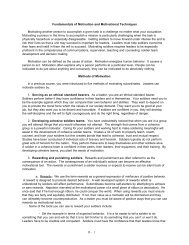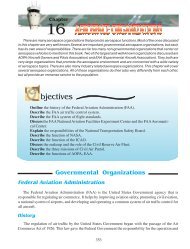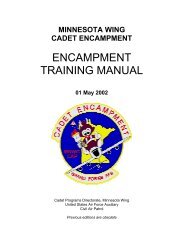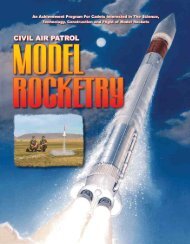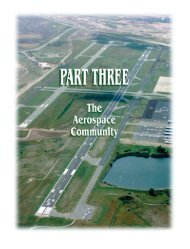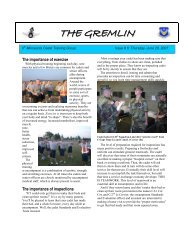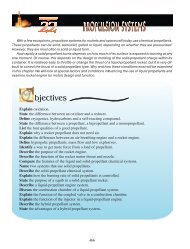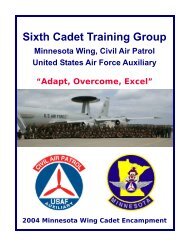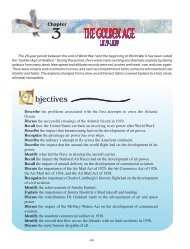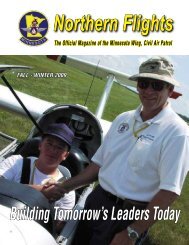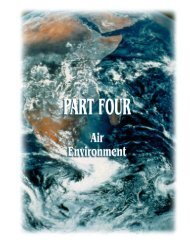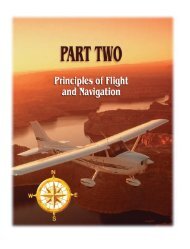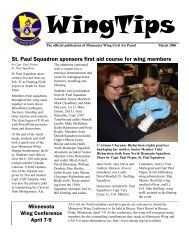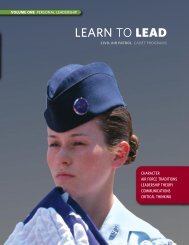front common challenges like violent extremism, nuclearproliferation, climate change, and a changing global economy.That is precisely the reason we should strengthen enforcementof international law and our commitment toengage and modernize international institutions andframeworks. Those nations that refuse to meet theirresponsibilities will forsake the opportunities that comewith international cooperation. Credible and effectivealternatives to military action—from sanctions to isolation—must be strong enough to change behavior, just as wemust reinforce our alliances and our military capabilities.And if nations challenge or undermine an internationalorder that is based upon rights and responsibilities, theymust find themselves isolated.We succeeded in the post-World War II era by pursuingour interests within multilateral forums like the UnitedNations—not outside of them. We recognized that institutionsthat aggregated the national inter-ests of many nationswould never be perfect; but we also saw that theywere an indispensable vehicle for pooling internationalresources and enforcing international norms. Indeed, thebasis for international cooperation since World War IIhas been an architecture of international institutions, organizations,regimes, and standards that establishes certainrights and responsibilities for all sovereign nations.In recent years America’s frustration with internationalinstitutions has led us at times to engage the United Nations(U.N.) system on an ad hoc basis. But in a world of transnationalchallenges, the United States will need to investin strengthening the international system, working frominside interna¬tional institutions and frameworks to facetheir imperfections head on and to mobilize transnationalcooperation.We must be clear-eyed about the factors that have impededeffectiveness in the past. In order for collective action tobe mobilized, the polarization that persists across region,race, and religion will need to be replaced by a galvanizingsense of shared interest. Swift and effective internationalaction often turns on the political will of coalitions ofcountries that comprise regional or international institutions.New and emerging powers who seek greater voiceand representation will need to accept greater responsibilityfor meeting global challenges. When nations breachagreed international norms, the countries who espousethose norms must be convinced to band together to enforcethem.We will expand our support to modernizing institutionsand arrangements such as the evolution of the G-8 to theG-20 to reflect the realities of today’s international environment.Working with the institutions and the countriesthat comprise them, we will enhance international capacityto prevent conflict, spur economic growth, improvesecurity, combat climate change, and address the challengesposed by weak and failing states. And we will challengeand assist international institutions and frameworks toreform when they fail to live up to their promise.Strengthening the legitimacy and authority of internationallaw and institutions, especially the U.N., will require aconstant struggle to improve performance.Furthermore, our international order must recognize theincreasing influence of individuals in today’s world.There must be opportunities for civil society to thrivewithin nations and to forge connections among them.And there must be opportunities for individuals and theprivate sector to play a major role in addressing commonchallenges—whether supporting a nuclear fuel bank, promotingglobal health, fostering entrepreneurship, orexposing violations of universal rights. In the 21st century,the ability of individuals and nongovernment actors toplay a positive role in shaping the international environmentrepresents a distinct opportunity for the United States.Within this context, we know that an international orderwhere every nation upholds its rights and responsibilitieswill remain elusive. Force will sometimes be necessary toconfront threats. Technology will continue to bring withit new dangers. Poverty and disease will not be completelyabolished. Oppression will always be with us. But if werecognize these challenges, embrace America’s responsibilityto confront them with its partners, and forge newcooperative approaches to get others to join us in overcomingthem, then the international order of a globalizedage can better advance our interests and the commoninterests of nations and peoples everywhere.STRENGTHENING NATIONAL CAPACITY—A WHOLE OF GOVERNMENT APPROACHTo succeed, we must update, balance, and integrate all ofthe tools of American power and work with our allies andpartners to do the same. Our military must maintain itsconventional superiority and, as long as nuclear weaponsexist, our nuclear deterrent capability, while continuingto enhance its capacity to defeat asymmetric threats, preserveaccess to the global commons, and strengthen partners.We must invest in diplomacy and development capabilitiesand institutions in a way that complements and reinforcesour global partners. Our intelligence capabilitiesmust continuously evolve to identify and characterizeconventional and asymmetric threats and provide timelyinsight. And we must integrate our approach to homelandsecurity with our broader national security approach.20
We are improving the integration of skills and capabilitieswithin our military and civilian institutions, so they complementeach other and operate seamlessly. We are alsoimproving coordinated planning and policymaking andmust build our capacity in key areas where we fall short.This requires close coopera-tion with Congress and adeliberate and inclusive interagency process, so that weachieve integration of our efforts to implement and monitoroperations, policies, and strategies. To initiate thiseffort, the White House merged the staffs of the NationalSecurity Council and Homeland Security Council.However, work remains to foster coordination acrossdepartments and agencies. Key steps include more effectivelyensuring alignment of resources with our nationalsecurity strategy, adapting the education and training ofnational security professionals to equip them to meetmodern challenges, reviewing authorities and mechanismsto implement and coordinate assistance programs, andother policies and programs that strengthen coordination.• Defense: We are strengthening our military to ensurethat it can prevail in today’s wars; to prevent and deterthreats against the United States, its interests, and ourallies and partners; and prepare to defend the UnitedStates in a wide range of contingencies against state andnonstate actors. We will continue to rebalance our militarycapabilities to excel at counterterrorism, counterinsurgency,stability operations, and meeting increasinglysophisticated security threats, while ensuring our force isready to address the full range of military operations.This includes preparing for increasingly sophisticatedadversaries, deterring and defeating aggression in antiaccessenvironments, and defending the United Statesand supporting civil authorities at home. The most valuablecomponent of our national defense is the men andwomen who make up America’s all-volunteer force. Theyhave shown tremendous resilience, adapt¬ability, andcapacity for innovation, and we will provide our servicemembers with the resources that they need to succeedand rededicate ourselves to providing support and carefor wounded warriors, veterans, and military families. Wemust set the force on a path to sustainable deploymentcycles and preserve and enhance the long-term viabilityof our force through successful recruitment, retention,and recognition of those who serve.• Diplomacy: Diplomacy is as fundamental to ournational security as our defense capability. Our diplomatsare the first line of engagement, listening to our partners,learning from them, building respect for one another, andseeking common ground. Diplomats, development experts,and others in the United States Government must be ableto work side by side to support a common agenda. Newskills are needed to foster effective interaction to convene,connect, and mobilize not only other governments and internationalorganizations, but also nonstate actors such ascorporations, foundations, nongovern¬mental organizations,universities, think tanks, and faith-based organizations,all of whom increasingly have a distinct role to play onboth diplomatic and development issues. To accomplishthese goals our diplomatic personnel and missions mustbe expanded at home and abroad to support the increasinglytransnational nature of 21st century security challenges.And we must provide the appropriate authorities andmechanisms to implement and coordinate assistance programsand grow the civilian expedi¬tionary capacityrequired to assist governments on a diverse array of issues.• Economic: Our economic institutions are crucialcomponents of our national capacity and our economicinstruments are the bedrock of sustainable nationalgrowth, prosperity and influence. The Office of Managementand Budget, Departments of the Treasury, State,Commerce, Energy, and Agriculture, United States TradeRepresentative, Federal Reserve Board, and other institutionshelp manage our currency, trade, foreign investment,deficit, inflation, productivity, and national competitiveness.Remaining a vibrant 21st century economic poweralso requires close cooperation between and among developednations and emerging markets because of the interdependentnature of the global economy. America—like other nations—is dependent upon overseas marketsto sell its exports and maintain access to scarce commoditiesand resources. Thus, finding overlapping mutual economicinterests with other nations and maintaining thoseeconomic relationships are key elements of our nationalsecurity strategy.• Development: Development is a strategic, economic,and moral imperative. We are focusing on assisting developingcountries and their people to manage securitythreats, reap the benefits of global economic expansion,and set in place accountable and democratic institutionsthat serve basic human needs. Through an aggressiveand affirmative development agenda and commensurateresources, we can strengthen the regional partners weneed to help us stop conflicts and counter global criminalnetworks; build a stable, inclusive global economy withnew sources of prosperity; advance democracy andhuman rights; and ultimately position ourselves to betteraddress key global challenges by growing the ranks ofprosperous, capable, and democratic states that can beour partners in the decades ahead. To do this, we are expandingour civilian development capability; engagingwith international financial institutions that leverage ourresources and advance our objectives; pursuing a developmentbudget that more deliberately reflects our policies21
- Page 1 and 2: VOLUME FOUR STRATEGIC PERSPECTIVESL
- Page 3 and 4: VOLUME FOUR STRATEGIC PERSPECTIVESL
- Page 5 and 6: VOLUME FOUR STRATEGIC PERSPECTIVESL
- Page 7: VOLUME FOUR STRATEGIC PERSPECTIVESL
- Page 10 and 11: 12CHAPTER 12INTRODUCTION TO STRATEG
- Page 12 and 13: 12.1 Strategic Leadership: Defining
- Page 14 and 15: mandates or resolutions that would
- Page 16 and 17: and ambiguity, aspiring strategic l
- Page 18 and 19: 12.2 National Security StrategyThe
- Page 20 and 21: within our borders has always been
- Page 24 and 25: and our strategy, not sector earmar
- Page 26 and 27: thinking about organizations. She m
- Page 28 and 29: A systemic approach to failure is m
- Page 30 and 31: The late W. T. Grant Company is a r
- Page 32 and 33: the resources - setting the directi
- Page 34 and 35: focal point for describing and inte
- Page 36 and 37: Consequently, we do not restrict th
- Page 38 and 39: paragraphs, Web pages, then edit an
- Page 40 and 41: Web, can be viewed as a CS attempt
- Page 42 and 43: How to evaluate users and contribut
- Page 44 and 45: 13CHAPTER 13LEADING PUBLIC &VOLUNTE
- Page 46 and 47: 13.1 Leadership for Volunteers:The
- Page 48 and 49: 13.2 Take Root: Volunteer Managemen
- Page 50 and 51: QualificationsClearly list educatio
- Page 52 and 53: and effectively track their volunte
- Page 54 and 55: • Understand rules for recognitio
- Page 56 and 57: • Send a birthday card.• Submit
- Page 58 and 59: and tested more than six decades af
- Page 60 and 61: specific interests of the donors, v
- Page 62 and 63: tain) tax-exempt status from the In
- Page 64 and 65: Smucker, 1999).The Internal Revenue
- Page 66 and 67: culture is necessary to ensure the
- Page 68 and 69: 13.4 The New Look of TransparencyBy
- Page 70 and 71: ees for a couple of reasons: One, i
- Page 72 and 73:
13.5 Public and Private Management:
- Page 74 and 75:
TABLE 1:FUNCTIONS OF GENERAL MANAGE
- Page 76 and 77:
3. Career System. The model corpora
- Page 78 and 79:
islative charter - the Clean Air Ac
- Page 80 and 81:
In controlling performance, Chapin
- Page 82 and 83:
14CHAPTER 14AIRPOWER ASSTRATEGIC LA
- Page 84 and 85:
14.1 Strategic Air Power: Fulfillme
- Page 86 and 87:
carry it out. Their daylight raids
- Page 88 and 89:
you did not rely on strategic bombi
- Page 90 and 91:
14.2 Warden and the Air Corps Tacti
- Page 92 and 93:
ecomes one of applying sufficient i
- Page 94 and 95:
tification, and a Jominian claim to
- Page 96 and 97:
courage the rapid and widespread ex
- Page 98 and 99:
it to influence physical players in
- Page 100 and 101:
14.4 Basic Air Force DoctrineAF Doc
- Page 102 and 103:
earthquake-stricken Haiti. The worl
- Page 104 and 105:
perspective. Airmen do not divide u
- Page 106 and 107:
Command and ControlCommand and cont
- Page 108 and 109:
14.5 Should the US Maintain the Nuc
- Page 110 and 111:
form of human government.” 20 Dem
- Page 112 and 113:
obtainable goal. See the Global Zer
- Page 114 and 115:
15CHAPTER 15ORGANIZATIONAL CULTURE
- Page 116 and 117:
15.1 Organizational CultureBy Doria
- Page 118 and 119:
Review. This action strives to unco
- Page 120 and 121:
gram will serve and then having the
- Page 122 and 123:
ticipating the changes being made b
- Page 124 and 125:
Many years of working with change p
- Page 126 and 127:
At the least, the areas of concern
- Page 128 and 129:
15.4 Developing an Innovative Cultu
- Page 130 and 131:
CONCLUDING THOUGHTSIn an ever-chang
- Page 132 and 133:
global issues. Businesses that poss
- Page 134 and 135:
— Sees the big picture—the shif
- Page 136 and 137:
16CHAPTER 16STRATEGIC COMMUNICATION
- Page 138 and 139:
16.1 Principles of Strategic Commun
- Page 140 and 141:
16.2 The Art of NegotiationBy Brend
- Page 142 and 143:
16.3 Negotiating Effectively Across
- Page 144 and 145:
hidden areas can act as cultural ho
- Page 146 and 147:
and four conflict styles. Hammer be
- Page 148 and 149:
maintaining the relationship. As th
- Page 150 and 151:
25 Mitchell R. Hammer, “Chapter 1
- Page 152 and 153:
tural, socioeconomic, and psycholog
- Page 154 and 155:
for the win-win," during which time
- Page 156 and 157:
interests and, at worst, as a gun s
- Page 158 and 159:
Public diplomacy is surely about mu
- Page 160 and 161:
But public diplomats do not have th
- Page 162 and 163:
Photo courtesy of the familyThe LEA
- Page 164:
THE CADET OATHI pledge that I will



